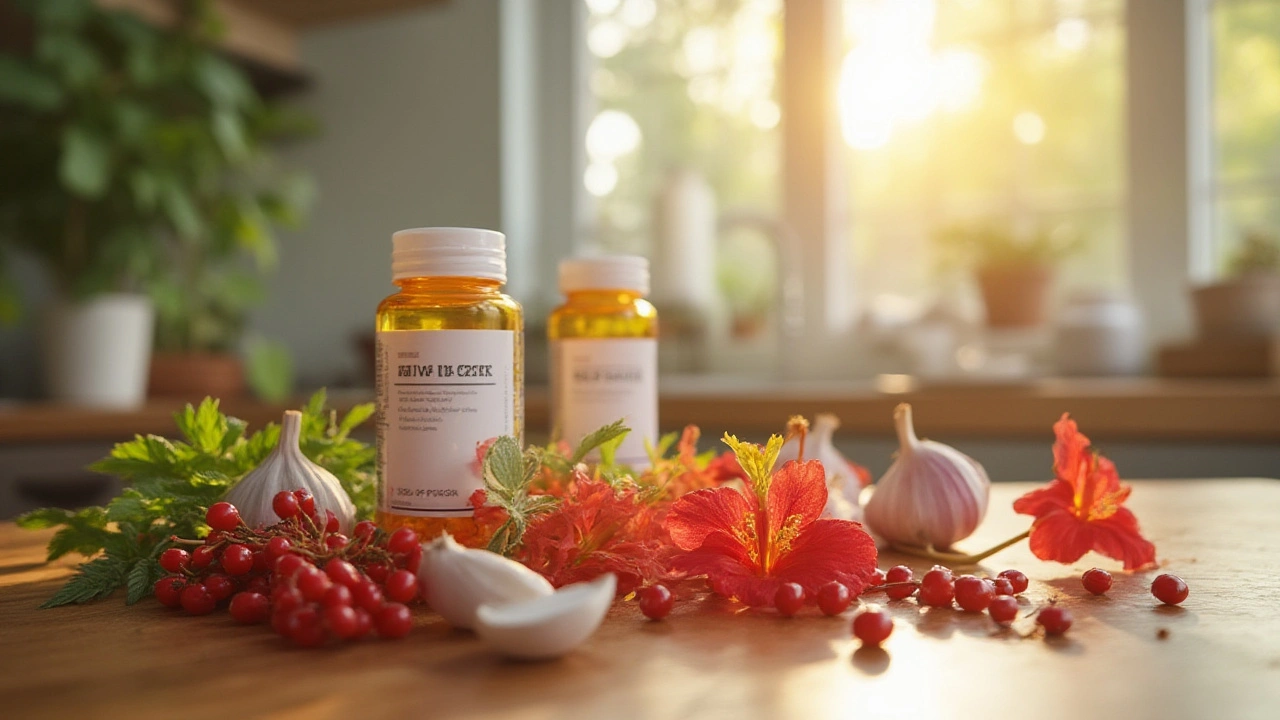
Health July 21, 2025
Herbal Beta-Blocker Alternatives: Clinical Trials on Hawthorn, Garlic, and Hibiscus
If you’ve ever stared at a pharmacy shelf and wondered if there’s something friendlier to your system than prescription beta blockers, you’re far from alone. Prescription beta blockers work for the heart, but side effects—like fatigue, cold hands, brain fog, and sometimes even sexual dysfunction—can make them a bit of a nightmare for some. That’s why natural options like hawthorn, garlic, and hibiscus are grabbing attention in both clinics and kitchen cupboards. What’s real hype, and what’s backed by real science? If you have ever wished for more natural control of your blood pressure and heart rhythm, read on.
Why Beta Blockers Aren’t for Everyone
Beta blockers have dominated the world of heart health for decades, prescribed for high blood pressure, irregular heartbeat, migraine prevention, anxiety, and even after heart attacks. The way they work is pretty clever—they block the effects of adrenaline, slowing your heart and relaxing your blood vessels. For millions, that’s been lifesaving. But as anyone who’s experienced the more frustrating side effects knows, not every patient clicks with these meds. Think about struggling to get out of bed, feeling perpetually chilly, having your workouts stalled because your heart won’t speed up, or just dealing with a low mood. For some, these are trade-offs not worth making unless absolutely necessary.
That’s led researchers to look at other ways to get similar benefits—lower heart rate, steadier blood pressure, improved circulation—without feeling like you’ve lost your old self. People have turned to supplements, diet tweaks, breathing exercises, and, more recently, herbs. But clinical proof matters. So what’s been done in rigorous studies, not just word-of-mouth stories? Three plants—hawthorn, garlic, and hibiscus—are at the center of recent attention. All are familiar, affordable, and found in health shops or even your local market. But is there substance to the buzz?
Hawthorn: Clinical Trials on a Timeless Cardiac Tonic
Hawthorn berries and leaves have been used across Europe for centuries, especially before modern heart drugs existed. In the last 30 years, actual controlled clinical trials have stepped in to see if folklore was right. A landmark study published in the European Journal of Heart Failure in 2001 followed 900 patients with early-stage heart failure. Half received a standardized hawthorn extract; the other half, a placebo. Those taking hawthorn showed measurable improvements in heart efficiency, reported less breathlessness, and were able to tolerate more physical activity. The coolest part? The side effect rate matched the placebo group. Participants did not even notice troublesome reactions like sleepiness or digestive upset in any significant number.
Other trials have focused on blood pressure. One well-designed British study followed people with type 2 diabetes and mild hypertension as they used hawthorn daily for four months. The hawthorn group’s average systolic blood pressure dropped by 2.6 mmHg. Not groundbreaking, but meaningful if you consider this is alongside standard care, not instead of. However, don’t expect miracles if you’re already on aggressive medical regimens—these results shine brightest for people in the early stages, or those making lifestyle changes to delay heavier medications.
Practical tip: Consistency and dose matter. Most trial supplements used standardized extracts, not teas or dried fruit. Look for a product that contains 450–900mg of hawthorn extract standardized to oligomeric procyanidins. Always check with your doctor before starting—it can interact with heart meds or blood thinners.
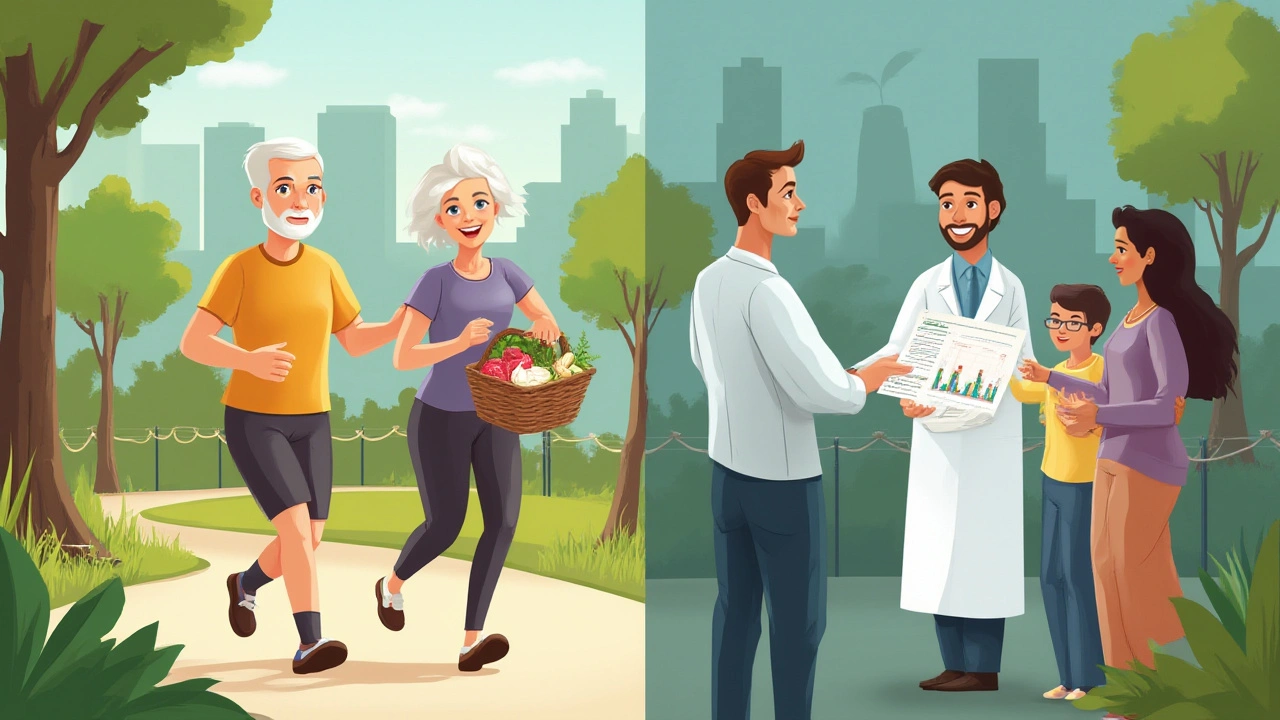
Garlic: From Kitchen Staple to Cardiovascular Ally
Ask any GP in the 1990s about garlic for cholesterol or blood pressure, and you’d get a skeptical eye roll. Now? Garlic is one of the world’s most widely studied herbs for cardiovascular support. A big meta-analysis published in 2020 crunched numbers from 12 randomised, double-blind, placebo-controlled trials on garlic’s effect on blood pressure. Nearly 600 people with high baseline readings participated. When taken daily for at least two months, aged garlic extract cut systolic blood pressure by an average of 8 mmHg and diastolic by 5.5 mmHg. To put it into context, that’s similar to what studies show with first-line medications for mild hypertension.
What’s behind this effect? Garlic contains allicin and other sulfur compounds that help arteries relax and suppress signals that make blood vessels constrict. Another bonus: cholesterol numbers improve, and there’s a mild anti-platelet effect (meaning garlic may make your blood less sticky, which is usually good for stroke risk but needs caution if you’re on blood thinners).
Few side effects show up in trials, but let’s be honest—some folks don’t love garlic breath or digestive discomfort. If you want the clinic-tested benefits, aim for aged garlic supplements, not supermarket bulbs, since most research used 600–1200mg daily. They’re gentler on the stomach too. If you’re thinking about stacking garlic with prescription meds, talk to your doctor. That’s especially true if you take warfarin or aspirin, since garlic’s mild blood-thinning effect can add up.
Hibiscus: The Bright Brew With Real Blood Pressure Power
Forget about plain old green or black tea. In a cheerful pink cup of hibiscus tea, you get real, measurable blood pressure improvements. The largest clinical trial to date for hibiscus was published in the Journal of Nutrition, tracking 65 pre-hypertensive or mildly hypertensive adults over six weeks. Participants drank three cups of hibiscus tea daily. At the end, those in the hibiscus group had a 7.2 mmHg drop in systolic pressure and a 3.1 mmHg drop in diastolic pressure, clearly more than the placebo group sipping a lookalike, herbal-free drink. That’s impressive if you compare it to many leading blood pressure drugs, especially for people yet to start medication.
What’s the secret? Hibiscus is loaded with anthocyanins and other polyphenols that relax blood vessels, lower inflammation, and may even help balance cholesterol. No big side effects cropped up in trials—just a slight increase in urination (likely from a natural diuretic effect). Some find the tart taste refreshing, others sweeten it a bit. You can brew your own with dried hibiscus petals or buy herbal tea bags without added sugar, which makes it easy to fit into daily life.
One practical tip: If you’re already on antihypertensive medicines, track your readings. Hibiscus isn’t for everyone, especially if you already have low blood pressure or take prescription diuretics. And as always, let your healthcare provider know. There’s nothing more frustrating than getting into a healthy routine and having strange symptoms, only to discover it’s an interaction that could’ve been flagged early.
Still undecided about which natural route fits you best? There’s now a helpful resource with a roundup of every major natural alternative to beta blockers—covering more options and details, which might help you chat to your own doctor with confidence rather than just ‘googling’ remedies.
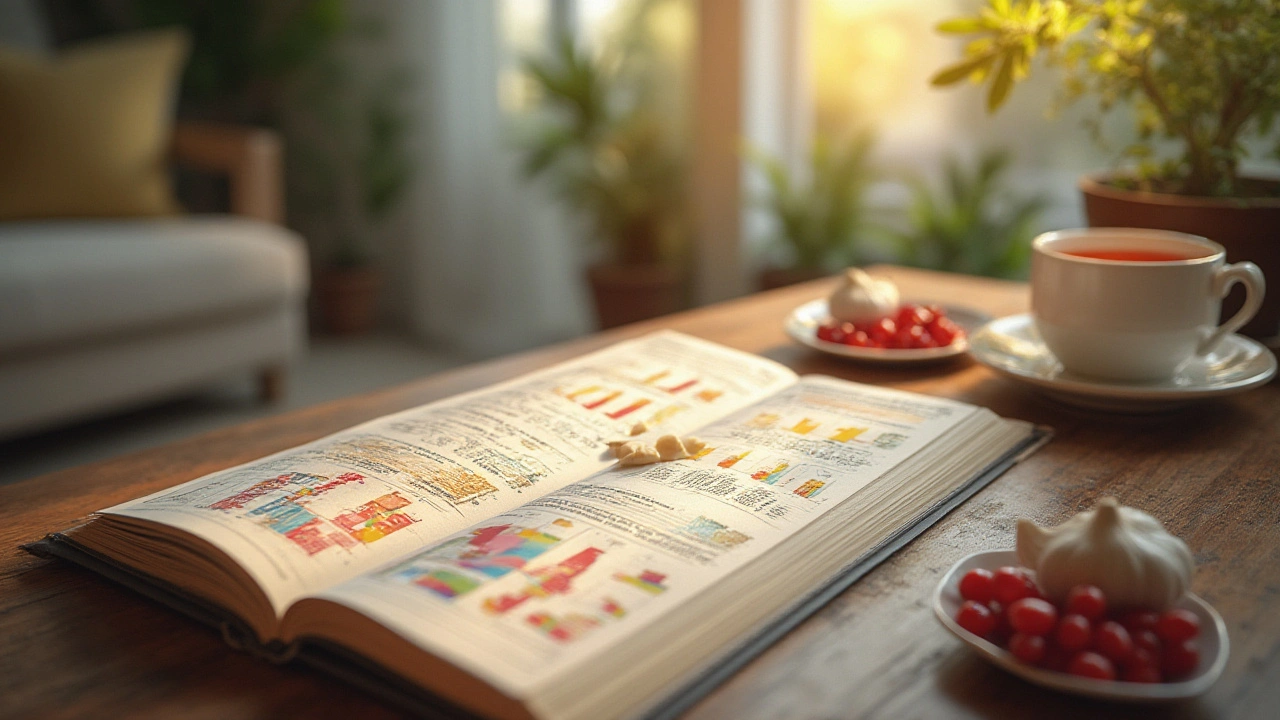
Weighing the Science: Are Herbal Alternatives Enough?
No one wants to swap a known pharmaceutical for something unknown, especially if their heart is on the line. So here’s the bottom line—clinical studies on hawthorn, garlic, and hibiscus do show real benefit for people with mild to moderate high blood pressure, and for those at the earliest stage of heart issues who aren’t needing beta blockers for life-threatening conditions. The best results come from consistent use, choosing certified, standardized extracts, and never mixing with prescription heart meds unless you discuss it with a doctor first.
Another thing: Studies often tracked people for weeks or months, but not years. Researchers still don’t know whether long-term use can completely swap out prescriptions if you have a serious diagnosis. However, these herbs can buy time, potentially keep you at a lower-risk stage for longer, and help you feel a bit more in control. For some, combining herbal support with lifestyle tweaks—like salt cuts, regular activity, and meditation—makes a real difference. No miracle cure exists, but a lot of people find these plant-based options are worth the experiment, especially when side effects are so rare compared to prescription beta blockers.
If you’re tempted to try, check labels closely. For hawthorn, aim for a standardized extract; for garlic, look for odorless aged supplements; for hibiscus, stick with pure dried petals or certified teabags. Jazz up your routine and track your blood pressure with a home monitor—it’s easier now than ever. And if in doubt? A quick check-in with a health professional is your best safety net. Herbal alternatives aren’t just an old wives’ tale anymore: they’re shaping up as genuine contenders, especially if you want to dodge the usual med side effects and keep your heart running smooth.
Write a comment
Items marked with * are required.
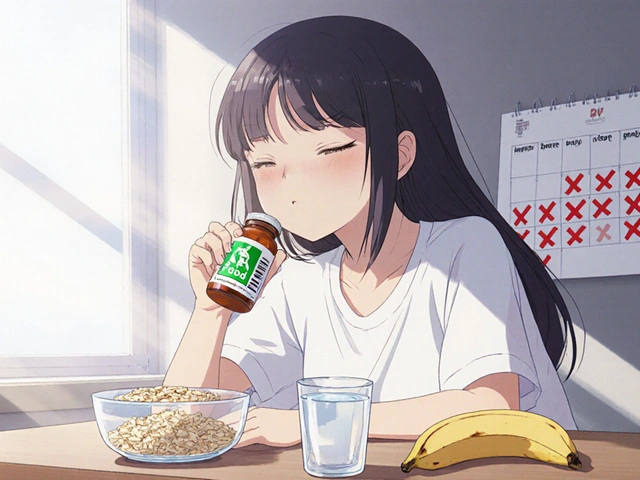

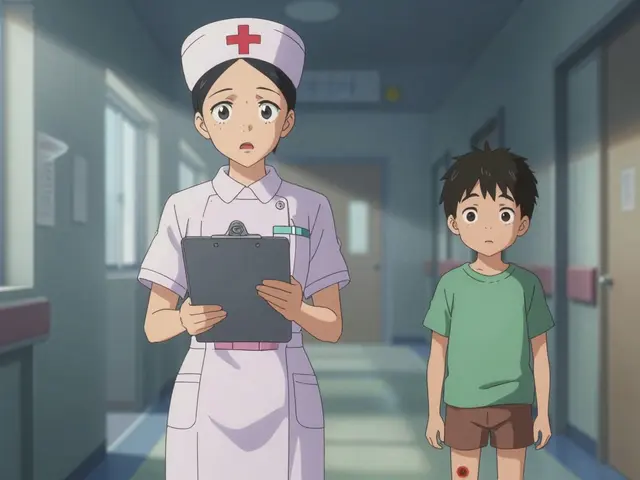
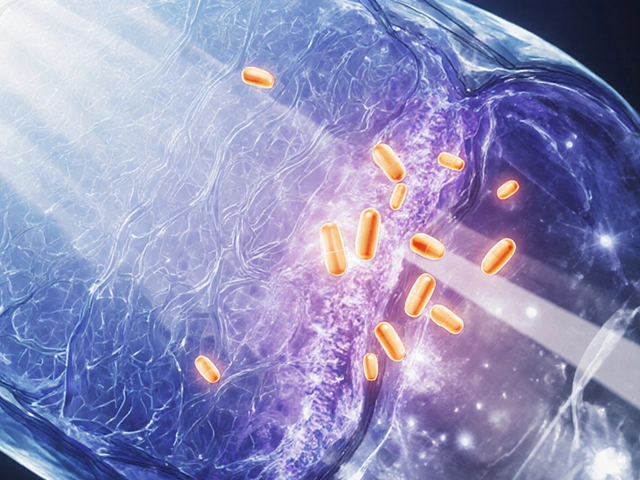


18 Comments
Leah Beazy July 23, 2025 AT 09:34
I started drinking hibiscus tea last winter after my BP spiked post-stress. Didn't ditch my meds, but my readings dropped by like 8 points. Now I drink it cold with a splash of honey. Best part? No brain fog. Just chill pink tea vibes. 🌸
John Villamayor July 25, 2025 AT 01:33
Garlic supplements changed my life. No more garlic breath if you get the aged kind. I take two capsules a day and my cholesterol dropped without any side effects. My doc was shocked. Not magic but definitely real. 10/10 would recommend
Jenna Hobbs July 25, 2025 AT 13:27
YALL. I switched from beta blockers to hawthorn extract after my anxiety got worse on meds. I was crying in the pharmacy aisle thinking I’d never feel normal again. Then I found this 900mg standardized extract. Three weeks later I was hiking again. No more cold hands. No more sluggishness. I’m not saying it’s for everyone but for me? It was a second chance. Thank you for writing this. 💛
Ophelia Q July 25, 2025 AT 21:10
Just wanted to say thank you for this post. I’ve been researching this for months and you broke it down so clearly. I started hibiscus tea and garlic capsules together. My BP is now stable without the fatigue. I feel like myself again. Also, hibiscus tea is so pretty in the mug. ☕️❤️
Elliott Jackson July 27, 2025 AT 20:22
Oh great another 'herbs are magic' post. You know what's magic? FDA-approved drugs that have been tested on millions. Hawthorn? Sounds like something your grandma brewed in a cauldron. And don't get me started on garlic. If you think a clove is replacing lisinopril you're one bad heart attack away from a coffin
McKayla Carda July 29, 2025 AT 03:52
Don’t ignore the interactions. I’m on warfarin. Garlic and hawthorn both thin blood. My INR went wild. Talk to your pharmacist. Always.
Christopher Ramsbottom-Isherwood July 29, 2025 AT 09:25
So hibiscus tea lowers BP? Wow. Next you’ll tell me sunlight cures depression. This is why medicine is broken. You’re telling people to replace science with tea bags. The real problem is Big Pharma. Not the meds
Stacy Reed July 29, 2025 AT 14:23
But what if your body is just inherently broken? What if herbs are just a bandaid on a bullet wound? Are you really okay with trading longevity for ‘feeling better’? I mean… is that living? Or just avoiding the truth?
Robert Gallagher July 30, 2025 AT 13:46
I tried all three. Hawthorn made me nauseous. Garlic gave me heartburn. Hibiscus? Perfect. I drink it every morning. My BP is down 10 points. I still take my low-dose beta blocker but I feel way better. Don’t go cold turkey. Ease in. Track your numbers. That’s the real advice.
Howard Lee July 31, 2025 AT 03:59
It's important to note that the studies referenced used standardized extracts, not raw herbs or teas. Dosage consistency is critical for efficacy. Aged garlic extract (AGE) at 1,200 mg daily showed the most reproducible results in meta-analyses. Always verify the extract type and concentration on the label.
Nicole Carpentier July 31, 2025 AT 13:33
My mom took hawthorn for 3 years after her heart surgery. Said she felt like she had her energy back. She’s 78 and still gardens. No meds. Just tea and walks. I’m trying it now. Fingers crossed
Hadrian D'Souza July 31, 2025 AT 18:10
Oh look, another ‘herbalist whisperer’ telling you that your $200/month pill is evil and your $12 tea bag is a miracle. Congrats. You just paid for placebo with extra steps. The real alternative? Exercise. Diet. Sleep. Not hibiscus tea with a side of delusion.
Brandon Benzi August 2, 2025 AT 06:12
USA is falling apart. First they ban caffeine, now they want us to drink tea instead of real medicine. This is why our country is weak. Real men take pills. Real men don’t brew herbs like hippies. Go back to India where this nonsense started.
Abhay Chitnis August 2, 2025 AT 11:50
Bro hawthorn is just Ayurvedic nonsense. In India we use ashwagandha and arjuna for heart. Not some European berry. You think this is science? This is folklore with a marketing budget. Also why is everyone ignoring the real issue? Stress. Sleep. Sugar. Not tea.
Robert Spiece August 3, 2025 AT 05:01
So you’re telling me a plant extract can do what a pharmacologically designed receptor antagonist does? That’s like saying a rock can replace a scalpel. The mechanism is different. The effect is not equivalent. You’re not replacing beta blockers-you’re distracting yourself from them. And that’s dangerous.
Vivian Quinones August 3, 2025 AT 16:42
My cousin’s friend’s sister took hibiscus and her BP went so low she passed out. So yeah. Don’t do it. I’m not saying don’t try herbs. I’m saying don’t be stupid. You don’t know what’s in those tea bags. I’m just saying… be careful.
Eric Pelletier August 5, 2025 AT 08:45
For those considering supplementation: Hawthorn’s active compounds are oligomeric procyanidins (OPCs). Look for 18.75% OPC content. Garlic should be allicin-potential (AP) >4000 mcg. Hibiscus tea should be 1.5g dry petals per 250mL water. Bioavailability matters. Don’t just buy whatever’s on sale.
Marshall Pope August 5, 2025 AT 13:20
just tried the hibiscus tea. tastes like sour candy. my bp is down. no side effects. im gonna keep it. thanks for the post